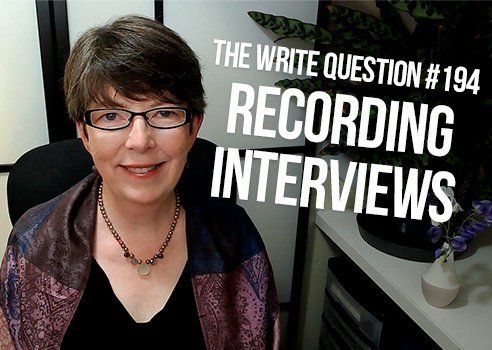Viewing time: 4 mins 19 secs
The Write Question is a weekly video podcast all about writing. Today’s question? How can you stop recording interviews? If you have a question you’d like me to answer you can email me, tweet me @pubcoach, or leave a message for me at the Skype account, The Write Question.
Transcript:
How can you stop recording interviews? That’s the topic I’m addressing today in The Write Question. I’m Daphne Gray-Grant, the Publication Coach, finally out of pandemic mode because I’ve been able to get my second vaccination. Yahoo!
I have a question from Olivia Jackson, a writer based in Brampton, Ontario. Here’s what she’s asked by email…
“I’m a corporate communicator who wants to break the habit of digitally recording all my interviews. I’m taking notes directly to my computer as my subjects speak, but here’s the problem: I can’t seem to stop trying to type EVERYTHING they try to say. How do you listen and make sure you get the ‘jewels’ of their comments and ignore everything else?”
Thanks for the terrific question, Olivia. I did a video on interviewing about two years ago — link is in the show notes, below — but it didn’t address the important issue of recording.
I have two suggestions for you:
First, consider interviewing to be a bit like playing the piano. You need to have two hands doing different things at the same time. With piano, your right hand plays the melody while your left plays the chords.
With interviewing, you need to listen to what the subject says and ask responsive questions. But you also need to collect really good quotes, or as you describe them, ‘jewels.’
Whenever I’m doing an interview, it’s like a little bell goes off in my head when the subject says something that’s really quotable.
I look for short comments — 15 words or fewer — expressed in a particularly interesting or idiosyncratic way. See link in the show-notes below to my post on nine ways to identify the best quotes.
But remember, there is always a tension between asking the questions and collecting the quotes.
By the way, I never work from a prepared list of questions when interviewing — although, of course, I have prepared one. Instead, I try to live in the moment and respond to what the subject has said.
My second suggestion is to review your notes directly after your interview has finished. And I do mean directly. For example, if you’ve had to go somewhere to do the interview, you should check your notes in the car before you drive back to your office.
If you review your notes soon enough, you’ll be able to fill in any gaps with 95% accuracy. And for most corporate communicators, 95% is good enough because your story will also be checked by the source before it runs.
To stop relying on a recorder, Olivia, you’ll need both confidence and practice. In the interim, you might continue to record, but refuse to allow yourself to use that recording unless you’re truly desperate.
With enough practice, you will come to see that you are able to do two different things at the same time: take good notes and ask good questions.
Finally, let me wrap up with the words of the late productivity expert Stephen Covey: “The biggest communication problem is we do not listen to understand. We listen to reply.”
Olivia, as a corporate communicator, I imagine that you’re not actually listening to reply. Instead, you’re listening to figure out what to ask next. Keep my piano analogy in mind. You can learn to do more than one thing at a time.
*
If you’d like to learn more about how to make writing a happier and more rewarding process, check out my latest book Your Happy First Draft. I don’t sell it in bookstores or via Amazon. The only place to buy it is on my website, link on the screen below and in the show notes.


